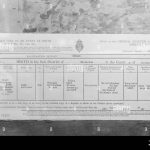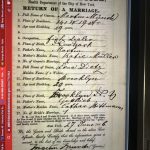A mother’s maiden name refers to the surname or last name that a woman possessed before getting married. In many cultures, a woman traditionally takes on her husband’s surname upon marriage, leading her maiden name to become her middle name or disappear completely.
The use of a mother’s maiden name often serves as a security measure or identification process to verify a person’s identity or access sensitive information in various contexts, such as banking, legal documents, or online accounts. It can also be utilized as a genealogical tool to trace a person’s family heritage and lineage through the maternal line.

Credit: issuu.com
The Significance Of Mother’s Maiden Name
The mother’s maiden name has historical origins and cultural references that highlight its importance. In many cultures, the maternal lineage is given great significance as it represents a link to the past and the generations that came before. It serves as a way to preserve family history and traditions.
In modern society, the mother’s maiden name still holds relevance. It is often used as a security measure for identification purposes, such as in banking or legal transactions. Additionally, it can provide valuable genealogical information for individuals conducting family research.
By recognizing and acknowledging the importance of the mother’s maiden name, we can appreciate and celebrate the role of maternal lineage in shaping our identities and understanding our roots.
The Evolution Of Mother’s Maiden Name Traditions
In many cultures, it is common for women to take on their husband’s surname after marriage. However, there are also cultures where women retain their maiden names or even use a combination of both surnames. This demonstrates the diverse range of naming customs across the world.
The impact of feminism on traditional naming practices:
Feminism has played a significant role in challenging traditional naming practices. Many women now choose to keep their maiden names to maintain their personal identity and professional reputation. Others hyphenate their surnames as a way to honor both family traditions.
Recent trends show a move towards more flexible naming options. Some couples combine their surnames to create a unique family name. Others take on their partner’s surname but continue to use their maiden name professionally. These shifting trends reflect a growing desire for individuality and the breaking of gender norms.
The Role Of Mother’s Maiden Name In Genealogy
The role of a mother’s maiden name in genealogy is crucial for tracing ancestral connections through maternal lines. While researching maternal lineage, one may face various challenges, such as limited documentation or difficulty in identifying married names. However, by utilizing genealogical resources and DNA testing, it becomes possible to overcome these obstacles and uncover vital information.
Genealogical resources, such as birth and marriage records, census data, and immigration records, can provide valuable clues towards identifying maternal ancestors. Digging deeply into these archives can reveal the maiden names of mothers, thus expanding the family tree.
Moreover, DNA testing can play a significant role in confirming ancestral connections on the maternal side. By comparing DNA results with relatives who share the same maternal lineage, one can establish relationships and fill in missing links in the family history.
| Challenges in researching maternal lineage | Utilizing genealogical resources and DNA testing |
|---|---|
| – Limited documentation | – Accessing birth and marriage records |
| – Difficulty in identifying married names | – Exploring census data |
| – Examining immigration records | |
| – DNA testing to confirm connections |
Privacy And Security Concerns
With the increasing concern over privacy and security, it has become imperative to safeguard personal information. One commonly used method is the utilization of the mother’s maiden name as a security measure. However, it is essential to address the potential risks and vulnerabilities that come with this practice.
To protect against identity theft and online security breaches, it is crucial to follow best practices. These include:
- Using complex and unique passwords for all online accounts.
- Regularly updating passwords to prevent unauthorized access.
- Avoiding sharing personal information on insecure platforms.
- Enabling two-factor authentication for added security.
- Being cautious of phishing attempts and suspicious emails.
- Regularly monitoring credit reports and bank statements.
- Using reputable antivirus software to protect against malware.
By implementing these measures, individuals can significantly reduce the risks associated with utilizing their mother’s maiden name as a security measure.
Mother’s Maiden Name In Legal And Financial Matters
Mother’s Maiden Name in Legal and Financial Matters
The mother’s maiden name holds significant importance in various legal and financial matters. Understanding the legal requirements and regulations involving maternal ancestry is crucial for individuals as it impacts several aspects of their lives.
Whether considering changing or preserving maiden names, individuals must be aware of the implications. In terms of estate planning, knowing the mother’s maiden name is essential for establishing rightful heirs and ensuring the correct distribution of assets.
In the realm of insurance and banking, the mother’s maiden name may serve as a point of verification and security. Institutions often use it as a security question to ensure the identity of individuals, preventing unauthorized access to personal accounts.
Thus, acknowledging the significance of the mother’s maiden name is essential to navigate various legal and financial matters with ease.
Mother’s Maiden Name As A Cultural Identifier
A mother’s maiden name holds significance as a cultural identifier, reflecting familial heritage and ancestry. It serves as a unique connection to one’s lineage, contributing to a sense of personal identity and belonging.
Mother’s Maiden Name as a Cultural Identifier
Exploring identity and belonging through maternal heritage.
Celebrating diversity in multicultural societies. Preserving and honoring maternal family traditions.
Preserving Mother’s Maiden Name In The Digital Age
Preserving Mother’s Maiden Name in the Digital Age
Documenting and archiving maternal lineage for future generations is essential, especially in the digital age where information can easily be lost or forgotten. One way to ensure the preservation of this valuable information is by incorporating mother’s maiden name into online profiles. By including this detail, individuals can make it easier for future family members to trace their roots and understand their maternal ancestry.
Another effective strategy is using social media to connect and share maternal ancestry. Platforms such as Facebook, Instagram, and Ancestry.com provide opportunities for individuals to create family trees, join genealogy groups, and connect with relatives who may also be interested in documenting their maternal lineage. These online communities can be invaluable resources for sharing stories, photographs, and historical documents related to maternal ancestors.
Frequently Asked Questions On Mother’s Maiden Meaning
What Does Mother’s Maiden Name Mean?
The mother’s maiden name refers to the surname a woman had before getting married. It is her family name from her birth or maidenhood, which she may choose to keep or change upon marriage.
Why Is The Mother’s Maiden Name Important?
The mother’s maiden name is important for identification purposes, particularly in situations where a person’s identity needs to be verified but their current married name might not be known. It can serve as a security question for confirming identity or accessing certain accounts.
Can Anyone Access A Person’s Mother’s Maiden Name?
Access to a person’s mother’s maiden name is typically restricted to the individual, close family members, and authorized personnel or systems for identification purposes. It is generally considered private information and should be safeguarded to prevent identity theft or unauthorized access to accounts.
How Can I Find My Mother’s Maiden Name?
To find your mother’s maiden name, you can start by asking her directly or checking official documents such as her birth certificate, passport, or marriage certificate. If those are not available, you may need to consult with family members or conduct genealogical research to retrieve this information.
Conclusion
Your mother’s maiden name holds great significance as it represents an integral part of your genealogy and personal identity. Whether you use it for security purposes or to explore your family history, acknowledging the significance of this information can help you navigate through various aspects of your life.
Embrace this connection to your roots and appreciate the deep-rooted meaning behind your mother’s maiden name.








